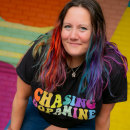Neurodiversity Speakers
You're planning an event or recording a podcast, and someone suggests bringing in a neurodiversity speaker.
Sounds great, right? But now what?
How do you actually find neurodiversity speakers who know their stuff and connect with your audience? Do you go clinical, personal, activist, academic?
There's a lot out there, and it can get confusing fast.
Neurodiversity speakers bring real stories, real expertise, and a much-needed shift in how we talk about brains, work, learning, and identity.
I've seen how the right speaker can reframe the entire tone of a panel or conference.
Whether you're looking for someone who can break down complex topics with clarity or share lived experience with power and nuance, this list will point you in the right direction.
Here, you'll find neurodiversity speakers with a range of voices, styles, and backgrounds - so you can find the right person for your audience, your topic, your vibe.
Scroll through, get inspired, and maybe even book someone amazing for your next event.
Top Neurodiversity Speakers List for 2026
Janine McDonald
Transforming chaos into clarity, one space at a time
Benjamin Meyer
Empowering neurodiverse lives through empathy, education, and connection.
Nimisha Patel
Empowering neurodiversity through coaching and compassionate connection
Maddy Alexander-Grout
Empowering neurodivergents to master money and thrive!
Karin Visser
Unlocking Potential, One Brain at a Time with Neurodiv Sisters
Jess Arce
Empowering parents to unlock their children's potential
Jheri South
Teen Parenting Coach and ADHD Specialist
Adam Sietz
Emmy-winning, Neurodiverse Broadway/Film/TV/VG Performer, Bestselling Author and Worlds Best Dad helping audiences trust themselves to adapt
Rikki Arundel
Award winning Keynote and virtual Speaker, Speaking/TEDx/Storytelling Coach and Gender and LGBTQ Inclusion expert.
Emma Fisher
Unlocking Communication in Parenting a Neurodiverse Child
What Makes a Great Neurodiversity Speaker
Take someone like Dr. Devon Price. They don't just talk about autism-they reframe it. Their talks challenge assumptions, highlight systemic barriers, and offer new ways to think about productivity, communication, and inclusion. That's the kind of speaker who doesn't just inform... they transform. And that's what separates the good from the great.
Great neurodiversity speakers also know how to meet their audience where they are. Whether they're addressing a corporate boardroom in London or a virtual classroom in Manila, they adjust their tone, language, and examples to resonate. They're not just preaching to the choir-they're reaching the curious, the skeptical, and the uninformed.
They also bring authenticity. Many of the most impactful speakers are neurodivergent themselves, and they're open about their experiences navigating education, work, and relationships. But it's not just about personal stories. They back it up with research, data, and actionable strategies. It's that blend of heart and head that makes their message stick.
And finally, they're generous. They don't gatekeep knowledge. They share resources, recommend others in the space, and leave audiences with tools they can use. Whether it's a downloadable toolkit or a new way to run meetings, great neurodiversity speakers leave people better than they found them.
How to Select the Best Neurodiversity Speaker for Your Show
1. Define Your Audience and Goals
- Are you speaking to HR professionals, educators, startup founders, or parents? Each group will need a different angle.
- Clarify what you want the audience to walk away with: awareness, tools, inspiration, or policy ideas?
2. Browse Speaker Platforms Like Talks.co
- Use platforms like Talks.co to filter speakers by topic, region, and experience level.
- Look for neurodiversity speakers who've been featured on podcasts, summits, or panels similar to yours.
3. Review Their Speaker Page
- A strong speaker page should include a bio, past appearances, video clips, and topics they cover.
- Pay attention to how they describe their work-do they align with your tone and values?
4. Watch or Listen to Past Talks
- Don't just skim their resume-watch them in action. Are they engaging? Clear? Do they connect emotionally?
- Look for versatility. Can they handle both live Q&A and pre-recorded segments?
5. Reach Out and Ask the Right Questions
- Ask about their availability, preferred formats (keynote, panel, fireside chat), and whether they tailor content.
- Bonus tip: Ask how they handle sensitive questions or pushback. The best speakers are prepared, not defensive.
By following these steps, you'll not only find someone who knows their stuff, but someone who can deliver it in a way your audience will remember.
How to Book a Neurodiversity Speaker
1. Start with Research
- Use platforms like Talks.co to discover vetted neurodiversity speakers with relevant experience.
- Check their availability, preferred formats, and whether they offer virtual, in-person, or hybrid options.
2. Reach Out with a Clear Ask
- When you contact them (or their rep), be specific. Include your event name, date, format, audience size, and topic focus.
- Example: "We're hosting a virtual summit for remote team leaders on inclusive hiring. Would you be open to a 30-minute keynote on neurodivergent talent?"
3. Discuss Logistics Early
- Confirm time zones, tech requirements, compensation, and whether they need a prep call.
- Ask if they'll promote the event to their audience-many speakers are happy to cross-promote if aligned.
4. Use a Speaker Agreement
- Even if it's a casual event, a simple agreement helps avoid confusion. Include deliverables, deadlines, and cancellation terms.
- If you're using Talks.co, many of these steps are built into the booking flow-super handy.
5. Prep and Support
- Send them a run-of-show, audience background, and any branding guidelines.
- Offer a tech check or rehearsal if needed. And always follow up with a thank-you and replay link after the event.
Booking a neurodiversity speaker is more than just filling a slot-it's about creating a meaningful moment for your audience. When done right, it's a win for everyone involved.
Common Questions on Neurodiversity Speakers
What is a neurodiversity speaker
But here's the key: they're not just talking about diagnoses. They're reframing how society understands cognitive differences. Rather than viewing neurodivergence as a deficit, they highlight it as a form of diversity-one that brings unique strengths and challenges.
Some neurodiversity speakers are professionals in psychology, education, or workplace inclusion. Others speak from lived experience, offering firsthand perspectives on navigating school, work, or relationships as a neurodivergent person. Many combine both.
Their audiences vary widely. A neurodiversity speaker might present to corporate leaders on inclusive hiring, to teachers on classroom strategies, or to parents on supporting their kids. The common thread? They're helping people understand and support neurodivergent individuals more effectively.
In short, a neurodiversity speaker is a communicator and bridge-builder-someone who helps translate complex ideas into accessible, actionable insights for diverse audiences.
Why is a neurodiversity speaker important
Neurodiversity speakers bring visibility to a group that's frequently misunderstood or overlooked. In corporate settings, for example, they can shift hiring practices by helping teams recognize the strengths of neurodivergent candidates. Think about companies like SAP or Microsoft, which have launched neurodiversity hiring programs after internal education efforts led by experts and speakers.
In education, these speakers help teachers and administrators move beyond outdated models of learning support. Instead of focusing solely on 'fixing' students, they promote environments that adapt to different learning styles. That kind of shift doesn't happen without someone guiding the conversation-and that's what a skilled speaker does.
They also help reduce stigma. By sharing real stories, data, and strategies, neurodiversity speakers normalize differences and encourage empathy. This is especially crucial in communities where mental health and neurodivergence are still taboo topics.
And finally, they catalyze change. Whether it's a startup founder rethinking team dynamics or a parent advocating for their child, the right speaker can spark action. That's not just important-it's transformative.
What do neurodiversity speakers do
1. Educate Audiences
- They deliver talks, webinars, and workshops that explain what neurodiversity is, why it matters, and how to support neurodivergent individuals.
- Example: A speaker might lead a session for tech managers on how to create more inclusive stand-up meetings for team members with ADHD.
2. Share Lived Experiences
- Many neurodiversity speakers are neurodivergent themselves. They use storytelling to humanize abstract concepts and challenge stereotypes.
- Their stories help audiences connect emotionally, not just intellectually.
3. Offer Practical Strategies
- They don't just talk theory. They give actionable tips-like how to design sensory-friendly workspaces or how to write job descriptions that don't unintentionally exclude neurodivergent applicants.
4. Consult and Advise
- Some speakers also work behind the scenes with HR teams, school boards, or event planners to shape policies and practices.
- For instance, they might help a conference organizer design a more accessible registration process.
5. Advocate for Systemic Change
- Beyond individual events, neurodiversity speakers often engage in broader advocacy-pushing for legal reforms, better healthcare access, or inclusive education policies.
In essence, neurodiversity speakers are educators, advocates, and changemakers. They don't just speak-they shift mindsets and systems.
How to become a neurodiversity speaker
1. Define Your Core Message.
- What aspect of neurodiversity do you want to focus on? Autism advocacy? ADHD in the workplace? Inclusive education? Get specific.
- Tip: Think about the intersection of your lived experience, your expertise, and what audiences are hungry to learn.
2. Build Credibility.
- You don't need a PhD, but you do need credibility. This could be lived experience, professional background, or community involvement.
- Example: If you're a neurodivergent entrepreneur, share how you've navigated business differently.
3. Create a Speaker Page.
- Use platforms like Talks.co to build a professional speaker profile. Include a bio, talk topics, testimonials, and a booking form.
- Bonus: Add a short video introducing yourself and your speaking style.
4. Start Speaking Anywhere.
- Don't wait for TEDx. Start with local events, webinars, podcasts, or even Instagram Lives.
- Reach out to hosts directly or use platforms like Talks.co to connect with event organizers.
5. Collect Feedback and Refine.
- After each talk, ask for feedback. What resonated? What confused people? Use that to sharpen your message.
- Pro tip: Record your talks (with permission) to review your delivery and improve.
6. Network with Other Speakers.
- Join online communities or speaker groups. Collaborate, cross-promote, and learn from others in the space.
- Look for speaker summits or virtual events where you can both learn and pitch yourself.
7. Get Paid and Go Pro.
- Once you've built a track record, start charging. Add your rates to your speaker page or mention them when pitching.
- Consider creating packages: keynote, workshop, panel appearance, etc.
This journey takes time, but if you're consistent and authentic, you'll carve out your space as a neurodiversity speaker.
What do you need to be a neurodiversity speaker
First, you need a clear perspective on neurodiversity. This could come from personal experience as a neurodivergent individual, a professional role supporting neurodivergent communities, or academic research. What matters is that your voice adds value to the conversation. For example, someone with dyslexia might speak about navigating education systems, while a workplace consultant might focus on inclusive hiring practices.
Second, you need communication skills. You don't have to be a polished performer, but you do need to engage an audience. That means structuring your talks well, using stories and examples, and adapting your message to different groups. Practice helps, and so does feedback. Recording yourself or joining a speaker group can accelerate your growth.
Third, you need a platform. This is where tools like Talks.co come in. A speaker page acts as your digital business card. It should include your bio, topics you speak on, testimonials, and a way for hosts to book you. You can also use it to connect with podcast hosts, event organizers, and other speakers.
Finally, you need a network. Speaking is often about who knows you. Attend events, join online communities, and collaborate with others in the neurodiversity space. The more visible and connected you are, the more opportunities will come your way.
So, what do you need to be a neurodiversity speaker? A message that matters, the skills to share it, the tools to promote it, and the relationships to grow it.
Do neurodiversity speakers get paid
Let's look at the data:
- Entry-level speakers might earn $0 to $500 per talk, especially if they're just starting out or speaking at community events.
- Mid-level speakers with a niche following or professional background can earn $1,000 to $5,000 per engagement.
- High-profile neurodiversity speakers, especially those with books, TEDx talks, or media appearances, can command $10,000 or more.
Here are some pros and cons to consider:
Pros
- Growing demand: As companies prioritize DEI (Diversity, Equity, Inclusion), neurodiversity is gaining attention.
- Multiple formats: Keynotes, panels, webinars, corporate training, and podcasts all present paid opportunities.
- Global reach: Virtual events allow speakers to connect with international audiences without travel costs.
Cons
- Inconsistent income: Unless you're booked regularly, income can be unpredictable.
- Pay gaps: Nonprofits and schools may offer lower fees or none at all.
- Exposure trap: Some events offer 'exposure' instead of payment, which may or may not lead to future gigs.
If you're just starting, you might do a few free talks to build your portfolio. But once you have a speaker page and a few testimonials, it's fair to start charging. Use Talks.co or similar platforms to showcase your value and connect with paying hosts.
How do neurodiversity speakers make money
1. Paid Speaking Engagements
- This includes keynotes, panels, workshops, and webinars.
- Corporate events tend to pay more than nonprofits or schools.
- Example: A neurodiversity consultant might charge $3,000 for a 60-minute corporate keynote on inclusive hiring.
2. Consulting and Training
- Many speakers offer consulting services to organizations looking to improve neurodiverse inclusion.
- This could be a one-off session or a long-term contract.
- Tip: Package your speaking and training together for higher-value deals.
3. Online Courses and Digital Products
- Speakers often turn their talks into online courses, eBooks, or toolkits.
- Platforms like Teachable or Gumroad make this easy.
- Example: A speaker might sell a $99 course on 'Neurodiversity in the Classroom' to educators.
4. Books and Publications
- Publishing a book can boost credibility and generate passive income.
- Self-publishing is common, but traditional publishing adds prestige.
5. Affiliate Marketing and Sponsorships
- Some speakers partner with brands or tools that align with their message.
- Example: Promoting a neurodiversity-friendly productivity app on their website or podcast.
6. Speaking Bureaus and Platforms
- Sites like Talks.co help speakers get discovered and booked.
- These platforms often handle payments and contracts, making it easier to scale.
So while speaking is the core, the real money often comes from what you build around it.
How much do neurodiversity speakers make
Entry-Level Speakers
- Range: $0 to $500 per talk.
- These speakers are often building their portfolio, speaking at community events, or guesting on podcasts.
Mid-Tier Speakers
- Range: $1,000 to $5,000 per engagement.
- They typically have a strong online presence, a speaker page (like on Talks.co), and a few high-profile clients or events under their belt.
Top-Tier Speakers
- Range: $10,000 to $25,000+ per keynote.
- These are often authors, TEDx speakers, or consultants with corporate partnerships.
Annual Income Potential
| Frequency of Speaking | Avg Fee per Talk | Estimated Annual Income |
|---|---|---|
| 1 talk/month | $2,000 | $24,000 |
| 2 talks/month | $3,000 | $72,000 |
| 4 talks/month | $5,000 | $240,000 |
- Niche: Corporate DEI talks pay more than school assemblies.
- Format: In-person keynotes usually pay more than virtual panels.
- Geography: Speakers in North America, Europe, and Australia tend to earn more due to event budgets.
Many neurodiversity speakers supplement their income with consulting, online courses, or books, which can significantly boost their annual earnings.
How much do neurodiversity speakers cost
Typical Cost Ranges
- Free to $500: Early-career speakers or those speaking at community events, schools, or nonprofits.
- $1,000 to $3,000: Mid-level speakers with a few years of experience and a professional speaker page.
- $5,000 to $10,000: Experienced speakers with media appearances, books, or corporate clients.
- $15,000+: High-profile speakers, often represented by bureaus or featured on platforms like Talks.co.
Cost by Format
| Format | Typical Range |
|---|---|
| Virtual Webinar | $500 - $3,000 |
| In-Person Keynote | $2,000 - $10,000 |
| Corporate Workshop | $3,000 - $15,000 |
| Panel Appearance | $500 - $2,000 |
- Travel and lodging (for in-person events).
- Customization fees (for tailored content).
- Licensing (if recording or distributing the talk).
Tips for Hiring
- Use platforms like Talks.co to compare speaker profiles.
- Be clear about your budget and expectations upfront.
- Consider offering value beyond money: media exposure, networking, or future bookings.
So whether you're a small nonprofit or a Fortune 500 company, there's likely a neurodiversity speaker who fits your budget and goals.
Who are the best neurodiversity speakers ever
John Elder Robison. Author of 'Look Me in the Eye', Robison speaks globally about living with Asperger's and neurodivergent innovation.
Judy Singer. The Australian sociologist who coined the term 'neurodiversity'. Her academic and advocacy work laid the foundation for the movement.
Dr. Devon Price. A social psychologist and author of 'Laziness Does Not Exist', Price brings a fresh, research-backed voice to neurodiversity and productivity.
Katherine May. Author of 'The Electricity of Every Living Thing', she speaks about late-diagnosed autism and neurodivergence in adulthood.
Jonathan Mooney. Dyslexic and ADHD, Mooney is a powerful speaker on education reform and neurodiverse learning.
Haley Moss. The first openly autistic lawyer in Florida, Moss speaks about neurodiversity in law, leadership, and inclusion.
David Finch. Author of 'The Journal of Best Practices', Finch mixes humor and insight in his talks on marriage and autism.
Naoki Higashida. Though he speaks through writing and translation, his book 'The Reason I Jump' has influenced global conversations on autism.
Rosie King. A young British speaker who challenges stereotypes about autism with boldness and creativity.
Who are the best neurodiversity speakers in the world
Kieran Rose (UK). Also known as 'The Autistic Advocate', Rose is a sought-after speaker on masking, identity, and neurodivergent rights.
Morénike Giwa Onaiwu (USA). A global speaker on intersectionality, disability justice, and neurodiversity, especially within BIPOC communities.
Chloé Hayden (Australia). An actress and influencer with autism, Hayden uses her platform to speak at schools, conferences, and media events.
Sam Holness (UK). A neurodivergent triathlete who speaks about autism, sport, and breaking stereotypes in high-performance environments.
Dr. Stephen Shore (USA). An academic and speaker who travels globally to promote inclusive education for autistic students.
Yenn Purkis (Australia). A non-binary autistic advocate and author who speaks about mental health, gender, and neurodiversity.
Tito Mukhopadhyay (India/USA). A non-verbal autistic author whose poetic writings and talks challenge perceptions of communication.
Leena Haque (UK). BBC neurodiversity lead and speaker on accessible media and inclusive design.
Kaitlyn Kleiner (Canada). A rising voice in neurodivergent entrepreneurship and inclusive tech design.
Common myths about neurodiversity speakers
1. Myth: Neurodiversity speakers only talk about autism.
This one's common, but it's off the mark. Neurodiversity includes a broad spectrum: ADHD, dyslexia, dyspraxia, Tourette syndrome, and more. Speakers like Dr. Devon Price, who speaks on autism and masking, or LeDerick Horne, who focuses on learning disabilities, show just how wide-ranging the topics can be.
2. Myth: You have to be neurodivergent to be a neurodiversity speaker.
While many speakers do share lived experience, allies and professionals also contribute valuable perspectives. For example, educators, psychologists, and workplace inclusion consultants often speak on neurodiversity from a research or policy lens. The key is authenticity and informed insight, not just identity.
3. Myth: Neurodiversity speakers are only relevant in educational settings.
This is outdated thinking. Today, neurodiversity is a hot topic in corporate hiring, UX design, entrepreneurship, and even entertainment. Microsoft's inclusive hiring initiatives and SAP's Autism at Work program have brought neurodiversity into boardrooms. Speakers like Jonathan Mooney have addressed audiences ranging from Google engineers to TEDx attendees.
4. Myth: Neurodiversity talks are always heavy or clinical.
Not true. Many speakers bring humor, storytelling, and creativity to the stage. Comedian Fern Brady, who speaks about being autistic, blends stand-up with advocacy. Others use poetry, visual art, or interactive formats to engage audiences emotionally and intellectually.
5. Myth: There's no real demand for neurodiversity speakers.
Actually, demand is growing across industries. Conferences on DEI, HR, tech, and education are increasingly seeking voices that can speak to neuroinclusion. The rise of virtual summits has also opened up global opportunities for neurodiversity speakers who may prefer remote formats.
Case studies of successful neurodiversity speakers
Take Haley Moss. She became Florida's first openly autistic attorney and now speaks globally about neurodiversity in the legal profession. Her talks blend personal narrative with practical advice for law firms and universities. What makes her stand out isn't just her credentials, but her ability to connect with both neurodivergent and neurotypical audiences through clarity and empathy.
Then there's Siena Castellon, a neurodivergent teen advocate from the UK. She started speaking at schools and youth events at just 16, focusing on empowering neurodivergent girls. Her story shows that age isn't a barrier. Her book, 'The Spectrum Girl's Survival Guide,' opened doors to international speaking gigs and policy advisory roles.
In the corporate world, Ed Thompson, founder of Uptimize, has carved out a niche by helping companies build neuroinclusive workplaces. While he's not neurodivergent himself, his talks are grounded in data and case studies, making him a go-to speaker for HR summits and tech conferences. His success lies in translating complex research into actionable strategies.
And let's not forget Yenn Purkis, an autistic and non-binary author and speaker from Australia. Their talks often focus on mental health and gender identity, intersecting with neurodiversity in powerful ways. Yenn's storytelling is raw, honest, and deeply human, resonating with audiences across continents.
Each of these speakers found their lane by leaning into their unique voice. Whether it's law, youth advocacy, corporate consulting, or intersectional identity, the common thread is clarity of message and consistency of purpose. That's what builds trust and opens doors.
Future trends for neurodiversity speakers
Here are a few trends to watch:
- Hybrid and asynchronous speaking formats. More conferences are offering pre-recorded talks, interactive Q&As, and virtual networking. This opens doors for neurodivergent speakers who prefer structured environments or need flexible pacing.
- Industry-specific demand. Fields like cybersecurity, design, and entrepreneurship are actively seeking neurodiversity insights. For example, UX teams want to understand cognitive accessibility, while startups are exploring how neurodivergent thinking fuels innovation.
- Globalization of neurodiversity discourse. Speakers from regions like South Africa, India, and Brazil are gaining visibility. This brings in fresh perspectives on how neurodivergence is perceived and supported across cultures. Expect more multilingual events and region-specific panels.
- Intersectional storytelling. Audiences are looking for speakers who can connect neurodiversity with race, gender, class, and disability. Talks that explore these intersections are not only more inclusive but also more impactful.
- Corporate accountability. Companies are moving beyond awareness to measurable inclusion. Speakers who can guide organizations through audits, policy shifts, and training programs are in high demand.
In short, the future isn't just about more neurodiversity speakers. It's about deeper, more nuanced conversations, and smarter platforms for delivering them. If you're thinking about stepping into this space, now's a great time to start building your voice.
Tools and resources for aspiring neurodiversity speakers
1. Talks.co. A podcast guest-matching tool that connects speakers with relevant shows. Great for building your portfolio and getting comfortable with interviews. Tip: Filter by shows that focus on DEI, education, or entrepreneurship to find aligned hosts.
2. Neurodiversity Media. Offers articles, templates, and training specifically for neurodivergent professionals. Their speaker guides are practical and neuroinclusive.
3. LinkedIn Creator Mode. Turn on Creator Mode to showcase your speaking topics and build a following. Post short video clips from past talks or share insights to attract event planners.
4. Inclusive Speaker Orientation by Mozilla. A free training that helps speakers create inclusive presentations. Especially useful if you're speaking to mixed neurotypical and neurodivergent audiences.
5. Toastmasters International. While not neurodiversity-specific, it's a solid space to practice public speaking in a structured, supportive environment. Look for clubs that are open to accessibility adaptations.
6. Eventbrite. Not just for finding events, but also for spotting trends. Search for 'neurodiversity' or 'inclusion' to see what kinds of talks are being hosted and who's speaking.
7. Canva. Use it to design accessible slide decks. Choose high-contrast templates, readable fonts, and add alt text to visuals. Bonus: Canva has a growing library of presentation templates tailored for speakers.
These tools aren't just about logistics. They help you shape your message, find your audience, and show up with confidence. Combine them with clarity of purpose, and you're well on your way.









